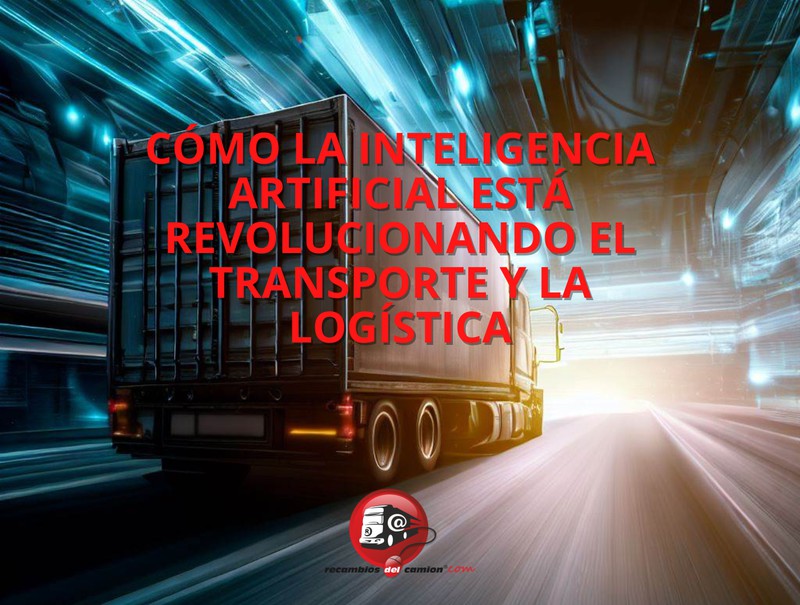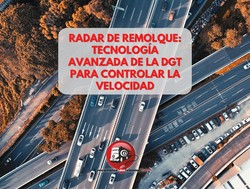How artificial intelligence is revolutionizing transportation and logistics
Artificial intelligence (AI) technology is rapidly transforming the transportation and logistics industry. From route planning to warehouse automation to highway safety, AI is changing the way resources are managed and products delivered. In the world of trucking, AI can help coordinate trips more cost-effectively, schedule optimal routes with minimal wait times, and adjust routes in real time based on traffic. But advances in AI don't stop there, it's also being used for warehouse automation, highway safety, and autonomous vehicles. In this article we will explore how AI is impacting the logistics and transportation sector, and how truckers can take advantage of these technologies to improve the efficiency and profitability of their operations.

Intelligent Route Optimization (IRO) is one of the most important applications of artificial intelligence in logistics and transportation. The IRO uses artificial intelligence algorithms to analyze and process vast amounts of data, such as information about traffic, weather, wait times and other factors, to determine the most efficient and profitable routes for truckers.
By using IRO, truckers can save time and money by reducing wait times, optimizing the use of resources, and improving efficiency in managing delivery routes. In addition, the IRO can help truckers meet delivery deadlines and improve customer satisfaction by ensuring that deliveries are made on time and efficiently.
Warehouse automation is one of the areas where artificial intelligence (AI) is having a significant impact on logistics and transportation. AI is being used to automate and optimize warehouse management, from receipt of merchandise to storage, sorting and distribution.
AI applied to robotics allows for greater efficiency in warehouse management, since robots can autonomously and accurately carry out transport and product placement operations, regardless of the characteristics they have. present.
In addition, AI makes it easier to adapt to changing warehousing and distribution needs, allowing for greater flexibility in supply chain management. AI-based warehouse management systems (WMS) can analyze vast amounts of data and optimize the management of resources, such as storage capacity, personnel and vehicles, to maximize efficiency and minimize costs.
Warehouse automation can also improve the safety and quality of work by reducing the number of repetitive and dangerous tasks performed by human workers. In addition, warehouse automation can improve the accuracy and speed of receiving and distributing goods, which can be crucial in high-demand situations or when urgent deliveries are required.
Another key aspect of AI in transportation is safety. Freight transport safety is a major concern for truckers and logistics companies. In recent years, artificial intelligence has proven to be a useful tool in improving safety in freight transport. AI applications in transportation can help minimize the dangers of driving in crowded urban areas and monitor compliance with safety regulations and vehicle maintenance reports.
One of the ways that AI can improve transportation safety is by detecting dangerous driving behaviors, such as driver distraction or aggressive driving. Artificial intelligence systems can continuously monitor driver behavior and alert the driver or control center in real time if dangerous behavior is detected. This can help prevent accidents and improve safety on the road.
Another use of AI in transportation security is in monitoring vehicle maintenance. AI can detect potential vehicle problems before they become more serious problems, which can help prevent mechanical failures that could result in accidents. In addition, the AI can also monitor vehicle performance and provide recommendations for fuel consumption optimization, which not only improves safety, but also the efficiency of transportation.
Smart roads are one of the most promising applications of AI in transportation. These highways are equipped with advanced technology to improve traffic safety and efficiency. Sensors embedded in these roads can detect traffic and weather conditions, allowing drivers to adapt their speed and make more informed decisions. Plus, smart lighting automatically adjusts light based on ambient conditions, increasing visibility and improving road safety.
Smart roads also have digital traffic signs that are updated in real time, allowing for greater flexibility in managing traffic and improving safety in emergency situations. Additionally, some smart roads are equipped with wireless charging systems for electric vehicles, allowing drivers to recharge their batteries while on the road. This contributes to increased adoption of electric vehicles and reduced greenhouse gas emissions.
In addition to the benefits for drivers and vehicles, smart roads can also have a positive impact on traffic management and route planning. AI can collect data in real time and process it to improve traffic efficiency and reduce wait times. Infotainment systems can also be integrated into vehicles to provide drivers with useful information on road conditions and alternative routes.
Route planning is one of the most widely applied areas of AI in transportation and logistics. With AI, more efficient routes can be programmed, considering various factors, such as weather, traffic, poor roads, among others.
AI in route planning also helps optimize wait times, journey times and fuel consumption. In addition, AI algorithms can perform predictive analytics based on historical traffic and weather patterns, allowing carriers to anticipate potential problems and divert from more dangerous or congested routes.
The AI also allows real-time updating of routes, for example, if a congestion is detected on the road, the system can automatically recalculate the optimal route to avoid traffic and get to your destination faster. destination.
In addition, AI can help coordinate truck trips so that peak traffic periods are avoided and highway off-peak hours are better utilized, which can reduce overall drive time. travel and improve transportation efficiency.
In short, AI has become an essential tool to improve the efficiency and safety of transport and logistics, as well as to reduce costs and optimize processes. In the trucking sector, knowing and mastering these technologies will be key to being able to compete in an increasingly digitized and demanding market.





Receive our news